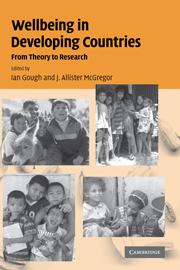Book contents
- Frontmatter
- Contents
- Figures
- Tables
- Notes on contributors
- Acronyms
- Preface
- Introduction
- 1 Theorising wellbeing in international development
- Part I Human needs and human wellbeing
- 2 Conceptualising human needs and wellbeing
- 3 Basic psychological needs: a self-determination theory perspective on the promotion of wellness across development and cultures
- 4 Measuring freedoms alongside wellbeing
- 5 Using security to indicate wellbeing
- 6 Towards a measure of non-economic wellbeing achievement
- Part II Resources, agency and meaning
- Part III Quality of life and subjective wellbeing
- Conclusion: researching wellbeing
- References
- Index
5 - Using security to indicate wellbeing
Published online by Cambridge University Press: 22 September 2009
- Frontmatter
- Contents
- Figures
- Tables
- Notes on contributors
- Acronyms
- Preface
- Introduction
- 1 Theorising wellbeing in international development
- Part I Human needs and human wellbeing
- 2 Conceptualising human needs and wellbeing
- 3 Basic psychological needs: a self-determination theory perspective on the promotion of wellness across development and cultures
- 4 Measuring freedoms alongside wellbeing
- 5 Using security to indicate wellbeing
- 6 Towards a measure of non-economic wellbeing achievement
- Part II Resources, agency and meaning
- Part III Quality of life and subjective wellbeing
- Conclusion: researching wellbeing
- References
- Index
Summary
Introduction
This chapter argues for socio-economic security to be included as a key component of wellbeing. It moves from theory to a discussion of principles and indicators, which could constitute part of an agenda for ongoing empirical research into wellbeing.
The chapter does not claim to present a comprehensive account of wellbeing or of socio-economic security (see ILO 2004, for example, for a labour-related agenda). Instead it addresses, axiomatically, a sub-set of ideas within a broader set of conceptions about wellbeing and security. It sees the problem of human security as a major element in the understanding of wellbeing. The approach adopted here reflects debates about vulnerability and livelihoods (Wood 2005), and operates with a strong sense of time, opportunity, choice and risk. Although the idea of security is inextricably associated with law and order and rights, here the focus is more upon the informal and social conditions for predictability of wellbeing rather than the statutory context for it. It tries to identify those ingredients of behaviour which are, or could be, in the control of ordinary people in poor situations, given modest policy support. The issue of predictability is central to the approach in this chapter, and, given prevailing hostile conditions in the political economy, there is an emphasis upon ordinary people's agency as the route to this predictability.
- Type
- Chapter
- Information
- Wellbeing in Developing CountriesFrom Theory to Research, pp. 109 - 132Publisher: Cambridge University PressPrint publication year: 2007
- 11
- Cited by

